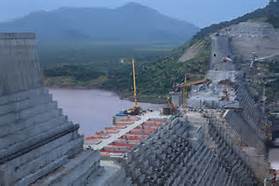Horo’s announcement came during an official launch event for the first phase of generating electricity from the GERD, which was attended by Prime Minister Abiy Ahmed and a large number of national and local officials.

Horo ruled out delaying the third filling of the dam, describing it as “an automatic process.”
He added that “the dam is formidable and any talk about its dangers is not correct,” before claiming that “Ethiopia has shared the information on the GERD with Egypt and Sudan.”
The construction of the dam will not stop “for any reason” and will be completed within two years, he said.
Horo added that statements from Egypt and Sudan on the dangers of the GERD “do not concern” Ethiopia, adding that Addis Ababa has not violated the 2015 Declaration of Principles, which were signed by the three countries, concerning the filling process.
The Ethiopian officials told the Saudi News channel that the second electricity-generating turbine will be tested “within weeks.”
In a speech during the event, Ethiopia’s PM Abiy Ahmed stated that the dam was constructed for development purposes for the Ethiopian people, adding that Ethiopia does not intend to harm the two downstream countries, Egypt or Sudan.
Egypt: GERD existential issue
On Tuesday, Egyptian Minister of Foreign Affairs Sameh Shoukry stated that Cairo is always ready for dialogue on the Grand Ethiopian Renaissance Dam (GERD) issue, describing the file as an existential issue and a matter of national security for Egypt and its people.
Shoukry made the statements to Sky News Arabia on the sidelines of the World Economic Forum (WEF) in Davos.
“[Previously exerted] efforts have not yielded a legally binding agreement regarding the GERD’s filing and operation policies, nevertheless, Cairo is working hard to push forward matters in order to reach an agreement that [simultaneously] allows Ethiopia to develop and safeguards Egypt’s rights,” the minister said.
Egypt and Sudan have been negotiating with Ethiopia for almost a decade now to reach a legally binding and comprehensive agreement on the filling and operation of the GERD, which Addis Ababa started building on the Blue Nile in 2010.
Cairo and Khartoum have blamed the failure of the talks on Ethiopian “intransigence” and refusal to sign any legally binding deal.
The latest round of African Union (AU)-sponsored talks between the three countries over the GERD in Kinshasa, DRC collapsed in April 2021, and all attempts to revive the negotiations since have failed.
Egypt’s top diplomat also told Sky News Arabia that Cairo closely follows up on the issue with international partners, but there have been no positive results so far.
Egypt is always prepared for dialogue and is ready to resume negotiations to settle this issue, Shoukry stressed.
Deadlock lingers
Prime Minister Mostafa Madbouly affirmed earlier in 2022 that Cairo is interested in resuming negotiations with Sudan and Ethiopia and resolving technical and legal points of contention to reach a balanced deal.
Egypt — which relies mainly on the Nile for its water needs — fears that the unilateral operation of the GERD and the filling of its 74-billion-cubic-metre reservoir will negatively impact its water supply, while Sudan is concerned the GERD will harm the regulation of flows to its own dams and their safety.
On the other hand, Ethiopia says the project — which will generate 5,250 megawatts of electricity when completed — is essential for producing electricity and economic development, repeatedly downplaying the concerns of Cairo and Khartoum.
Egypt has repeatedly stated that it has no objections to Ethiopia using the dam to generate the electricity it needs for its development plans.
However, Cairo said it opposes any action that compromises its already inadequate share of Nile water or changes its patterns.
Previously, Madbouly stressed that developments in Nile Basin countries were a priority for Egypt, stressing that Cairo has provided aid and expertise to help promote development and secure stability for its neighbours.
In February, Ethiopia, which had unilaterally completed the first and second filling of the dam, announced that the first turbine of the GERD has begun generating power.
The Ethiopian News Agency said at the time that the first turbine is generating 375 megawatts, with the second turbine set to operate soon.
In response, Egypt said the unilateral decision to start power generation from the GERD is another violation of the Declaration of Principles (DoP) signed between Addis Ababa, Cairo, and Khartoum in 2015.
Source: Ahram online

Leave a Reply